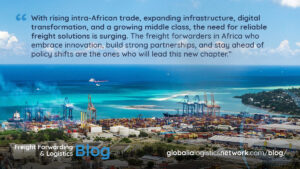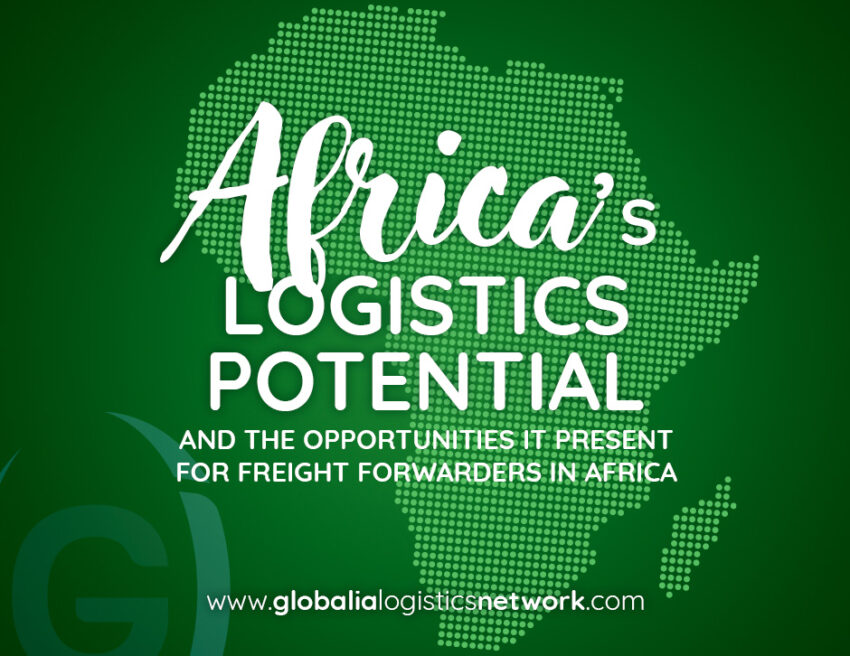Africa’s logistics sector is no longer the untapped frontier it used to be. With growing economies, expanding trade corridors, digital transformation, and massive infrastructure investments, the continent is steadily stepping onto the global freight stage. While challenges persist, such as port congestion, regulatory gaps, and underdeveloped transport links, so do real and growing opportunities. For freight forwarders in Africa, the next decade could be game-changing.
Let’s unpack where the momentum is, which countries are leading the charge, and why the logistics sector should be watching Africa more closely than ever.
Intra-African Trade: The AfCFTA effect
The African Continental Free Trade Area (AfCFTA), launched in 2021, is arguably the biggest shakeup to the region’s economic landscape in decades. It creates a single market for goods and services across 54 countries, potentially connecting 1.3 billion people with a combined GDP of over $3.4 trillion.
For freight forwarders in Africa, this means two things:
-
Cross-border demand will rise as trade barriers fall.
-
There will be an increasing need for efficient, regionally integrated logistics solutions.
Landlocked countries like Uganda, Rwanda, and Zambia stand to benefit the most, as more accessible routes and lower tariffs enable smoother flows of cargo between ports and inland destinations. Logistics providers that can manage these complex, multimodal supply chains will be in high demand.

Freight forwarders in Africa: Spotlight on growing hubs
When we talk about logistics growth in Africa, it’s not uniform. Certain countries are pulling ahead, and forwarders should be keeping an eye on these hot spots:
1. Kenya and the East African corridor
Kenya has solidified its role as a gateway to East Africa. The Port of Mombasa is undergoing expansion, and the Standard Gauge Railway (SGR) is streamlining inland cargo movement. Nairobi is also emerging as a regional air cargo hub.
2. Nigeria: West Africa’s logistics giant
With a population exceeding 200 million, Nigeria is both a huge consumer market and a major oil exporter. The Lekki Deep Sea Port, now operational, is a major milestone, expected to decongest Lagos ports and significantly reduce turnaround time for ocean freight.
3. Morocco: Africa’s link to Europe
Tangier Med Port in Morocco is now Africa’s largest port by cargo capacity, and it’s tightly integrated with European shipping networks. Morocco’s proximity to Europe, along with its investment in industrial zones, makes it a key re-export hub.
4. South Africa: The traditional leader recalibrates
South Africa continues to lead in terms of infrastructure maturity, despite some recent hiccups in rail and port performance. Durban and Cape Town remain vital export hubs for raw materials and agricultural products.
Infrastructure is finally catching up
The biggest historical barrier to African logistics has been infrastructure, or lack of it. Roads connecting major cities were often in disrepair or nonexistent. Rail networks were outdated or limited. Port handling was slow and unpredictable.
That’s changing.
-
China’s Belt and Road Initiative has funded new roads, railways, and port terminals across East and Central Africa.
-
Public-private partnerships are helping modernize key assets like airport cargo terminals and logistics parks.
-
Greenfield projects, like Rwanda’s Bugesera International Airport or Ethiopia’s dry ports, are helping landlocked nations become less dependent on their neighbors’ ports.
The knock-on effect is clear: supply chains are becoming more reliable, and previously unviable routes are opening up. Freight forwarders in Africa who understand the evolving landscape can offer more competitive transit times and pricing models.
The digital leap: Mobile logistics and visibility
Africa’s mobile-first culture is helping the logistics sector skip straight to digital. Platforms for eAWBs, GPS-based tracking, customs declarations, and mobile payments are becoming standard across key markets. For example, Nigeria Customs now offers digital clearance systems, and Kenya’s TradeNet has streamlined customs, port, and shipping processes into one interface. For freight forwarders, this means fewer delays and better cargo visibility. E-commerce is also accelerating this trend. As online shopping grows in countries like South Africa, Kenya, and Ghana, so does the need for last-mile logistics, smart warehousing, and agile freight forwarding.
How logistics networks help freight forwarders in Africa
In a landscape this fragmented and fast-changing, local expertise matters, but so does global reach. That’s where logistics networks can play a key role. Being part of an international freight forwarders network like Globalia Logistics Network can help African forwarders connect with trusted agents from nearly 130 countries, access secure business leads, and offer comprehensive international door-to-door services without relying on multinational competitors.
For instance, members of Globalia get access to tools that simplify quote generation, enhance visibility, and ensure secure transactions. More importantly, they become part of a vetted network where cooperation is incentivized and support is mutual. This can be especially valuable in markets where building global credibility takes time.
For freight forwarders in Africa looking to scale beyond borders without losing local identity, this kind of membership can play a key role in globalizing your business.
What still needs work?
Let’s be real. Africa’s logistics revolution is not without roadblocks.
-
Border delays are still a persistent issue in some corridors.
-
Customs regulations vary widely between countries, creating complexity.
-
Power outages and limited cold chain infrastructure impact perishables and pharma shipments.
-
Insurance, risk management, and cargo security still require better frameworks.
But progress is being made, and as private sector confidence grows, these issues are being tackled head-on. Governments are increasingly aware that logistics is the engine of economic growth, and reforms while slow are underway.
Looking ahead: A continent on the move
Africa isn’t just a logistics opportunity waiting to happen. It’s already happening. With rising intra-African trade, expanding infrastructure, digital transformation, and a growing middle class, the need for reliable freight solutions is surging. The freight forwarders in Africa who embrace innovation, build strong partnerships, and stay ahead of policy shifts are the ones who will lead this new chapter. This isn’t a five-year play. It’s a long-term shift. And the smartest logistics professionals are already building the foundation.
Final thought
For freight forwarders in Africa, the continent’s logistics evolution is no longer something to observe, it’s something to build. And those who start now will be the ones moving the goods, making the deals, and shaping the supply chains of tomorrow.


